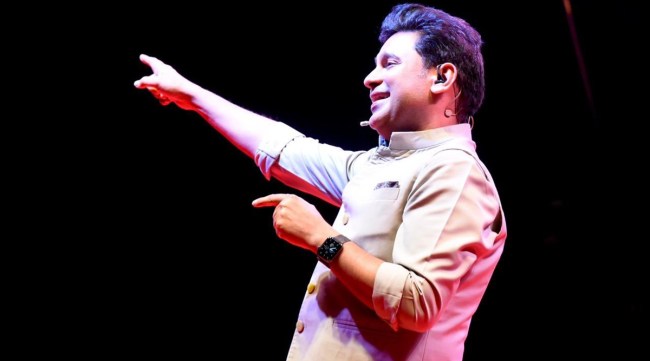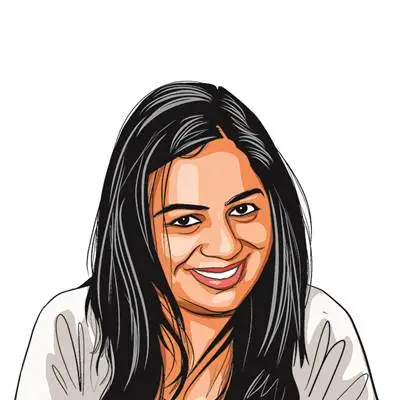Opinion Manoj Muntashir Shukla — Adipurush dialogue writer whose politics has come full circle to haunt him
Perhaps Shukla never anticipated that the very people he wrote for would bay for his blood because of what they believe to be 'blasphemous' lines that distort history
 Manoj Muntashir Shukla is the dialogue writer and lyricist of Adipurush. (Photo: Twitter/@manojmuntashir)
Manoj Muntashir Shukla is the dialogue writer and lyricist of Adipurush. (Photo: Twitter/@manojmuntashir) Earlier this week, poet Manoj Muntashir Shukla, the dialogue writer and lyricist of Adipurush — director Om Raut’s film “inspired” by Valmiki’s Ramayana — sought and then got security from Mumbai police. The massive backlash against his dialogues for the film had led him to believe that his life was in danger.
When the criticism first began, Shukla had fiercely defended the lines saying that he had not wanted them to be Sanskritised and that what he had written was “meticulously thought out” for a new audience that has not read the Ramayana or watched the television show created by Ramanand Sagar in the ’80s.
Perhaps Shukla never anticipated that the release of Adipurush — in and for a new India — promoting a new, raucous Hinduism, with superficial writing replacing any concept of piety, would backfire. And that the very people he wrote these lines for would bay for his blood because of what they believe to be “blasphemous” lines that distort history. Shukla has already changed the dialogues, not that the new ones are any better.
To understand what happened here, one needs to follow Manoj Muntashir Shukla’s professional trajectory. In Urdu, the word “muntashir” means scattered or widespread. In the ’90s when the poet from Amethi, the son of a priest, decided to replace Shukla with Muntashir as his surname — a term he’d heard in poet Habib Hashmi’s couplet on the radio — it was not just because the alliteration was attractive. He figured that there was no other poet who went by this pen name and Manoj Muntashir will be a strong signature for a poet.
Shukla worked in Bollywood for several years before he started getting noticed by the public. One could describe his early work as lacking in depth, but with songs like ‘Kaun tujhe’ (from MS Dhoni – The Untold Story, 2016), ‘Galliyan’ (from Ek Villain, 2014) and ‘Tere sang yaara’ (Rustom, 2016), which fit into the tonal space of the kind of sentimental film music popular during the last decade, he started becoming well-known. His finest moment has been ‘Teri mitti’ (from Kesari, 2019), a paean to patriotism sung very well by singer B Praak. But when it didn’t win a Filmfare award for best lyrics — ‘Apna time aayega’ from Gully Boy won instead — Shukla vowed to never attend an awards function again.
Apart from his work as a lyricist, Shukla also wrote scripts for shows like Kaun Banega Crorepati and India’s Got Talent and appeared on Indian Idol as a guest judge. In the latter, he pontificated on the notions of “desh” (nation), “ma” (mother), “pita” (father) and “sipahi” (soldier), among others.
About a year ago, Shukla put out a video titled ‘Aap kiske vanshaj hai’ in which, as a rousing score played in the background, he spoke about how unaware and “brainwashed” Indians are. He described the Mughals as “glorified dacoits”, adding that today’s Muslims have the same history as the Hindus of the nation and that they too are the descendants of Ram and that his criticism of Turks and Mughals was not a criticism of Islam.
The lesson in history, half-baked and reckless as it was, seemed to work. The video got one million views. Enough that he would have been noticed. An Indian-American commented, “… It is time for the Hindus to rise and reclaim their position…” Cause and effect.
Shukla spoke of Ravana too, that Brahmins do not worship him and have “banished” him even though he is of their caste. But Ravana, in India, has many dedicated temples and is worshipped by a number of Brahmins — such as the Saraswat Brahmins in Agra and Mathura. Shukla also described Raja Man Singh, a commander in Emperor Akbar’s army, who is remembered for his loyalty, a Rajput “kuldrohi” (traitor). He also drew a comparison between Sher Shah Suri’s Grand Trunk Road with the Ram Setu, and criticised people for only having regard for the Sur dynasty ruler’s legacy. Never mind that one is a fact and the other, a myth.
In a video titled “I am a Brahmin”, Shukla said, “Now that the number of pages on the Baburs and Shah Jahans are being reduced in our textbooks and Chhatrapati Shivaji and Lokmanya Tilak’s glory is increasing, Brahmins need to get the justice they deserve”. In another, with the Gyanvapi Mosque as the backdrop, he asks, “Why did the Mughals break temples to build mosques?” Did he imagine that playing the nationalism game could help him get success? He did win the National Award for Best Lyricist in 2022 for Saina (2020), the songs of which were, at best, mediocre.
Manoj Muntashir reattached “Shukla” to his name only recently and is now Manoj Muntashir Shukla. In an interview with Aaj Tak, he said that he did so after his previous surname (Muntashir) was “questioned”, especially after he began to raise his voice in “national interest”. “When I realised that it’s necessary to be a Shukla now, I became a Shukla,” he said, as the audience broke into loud applause. One wonders if it sounded too Muslim and if it was time to clarify his Brahminical identity. Years ago, he felt that Manoj Shukla didn’t carry “enough weight” as a poet’s name.
Would an artist who sees national interest through the prism of religion be likely to understand the complexity of this nation’s history and its diversity? Would he be able to look beyond Ram’s maryada to see his flaws or see beyond Ravana’s mistakes to perceive his brilliance? Hanuman’s speech was described by Valmiki as madhur vachan (words as sweet as honey) — this is the speech that Shukla has turned into tapori-speak in Adipurush, in an effort to play to the gallery. Unfortunately for Shukla, his gallery did what it has always done — make a raw assertion of power.
suanshu.khurana@expressindia.com




